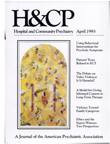Residents' and Nurses' Perceptions of Difficult-to-Treat Short-Stay Patients
Abstract
Objective: Characteristics attributed by nurses and by psychiatric residents to difficult-to-treat inpatients in a short-stay setting were compared to determine whether her discipline-specific perceptions of such patients existed. Methods: A total of 117 patients consecutively admitted to a short-stay inpatient unit were assessed by both psychiatric residents and nurses during the third week of hospitalization using subscales of the Hospital Treatment Rating Scales. The degree of management difficulty presented by each patient in 28 areas was rated, and an overall rating was calculated. Two separate regression analyses were used to examine characteristics of patients rated difficult. Results: Self-harm behaviors, violence toward others, and behaviors that sabotage treatment were identified by both nurses and residents as characteristics of difficult patients, although these characteristics contributed less to residents' perceptions of patient difficulty than to nurses'. For nurses, the most important additional characteristics contributing to treatment difficulty were related to patients' inability to form a therapeutic alliance. For residents, by far the most significant contributor to overall treatment difficulty was lack of response to medication. Conclusions: The dicipline-specific differences in perceptions of difficult-to-treat patients were associated with differences in professional roles. Communication problems between physicians and nurses may be due in part to their different perceptions of treatment and management difficulty.
Access content
To read the fulltext, please use one of the options below to sign in or purchase access.- Personal login
- Institutional Login
- Sign in via OpenAthens
- Register for access
-
Please login/register if you wish to pair your device and check access availability.
Not a subscriber?
PsychiatryOnline subscription options offer access to the DSM-5 library, books, journals, CME, and patient resources. This all-in-one virtual library provides psychiatrists and mental health professionals with key resources for diagnosis, treatment, research, and professional development.
Need more help? PsychiatryOnline Customer Service may be reached by emailing [email protected] or by calling 800-368-5777 (in the U.S.) or 703-907-7322 (outside the U.S.).



